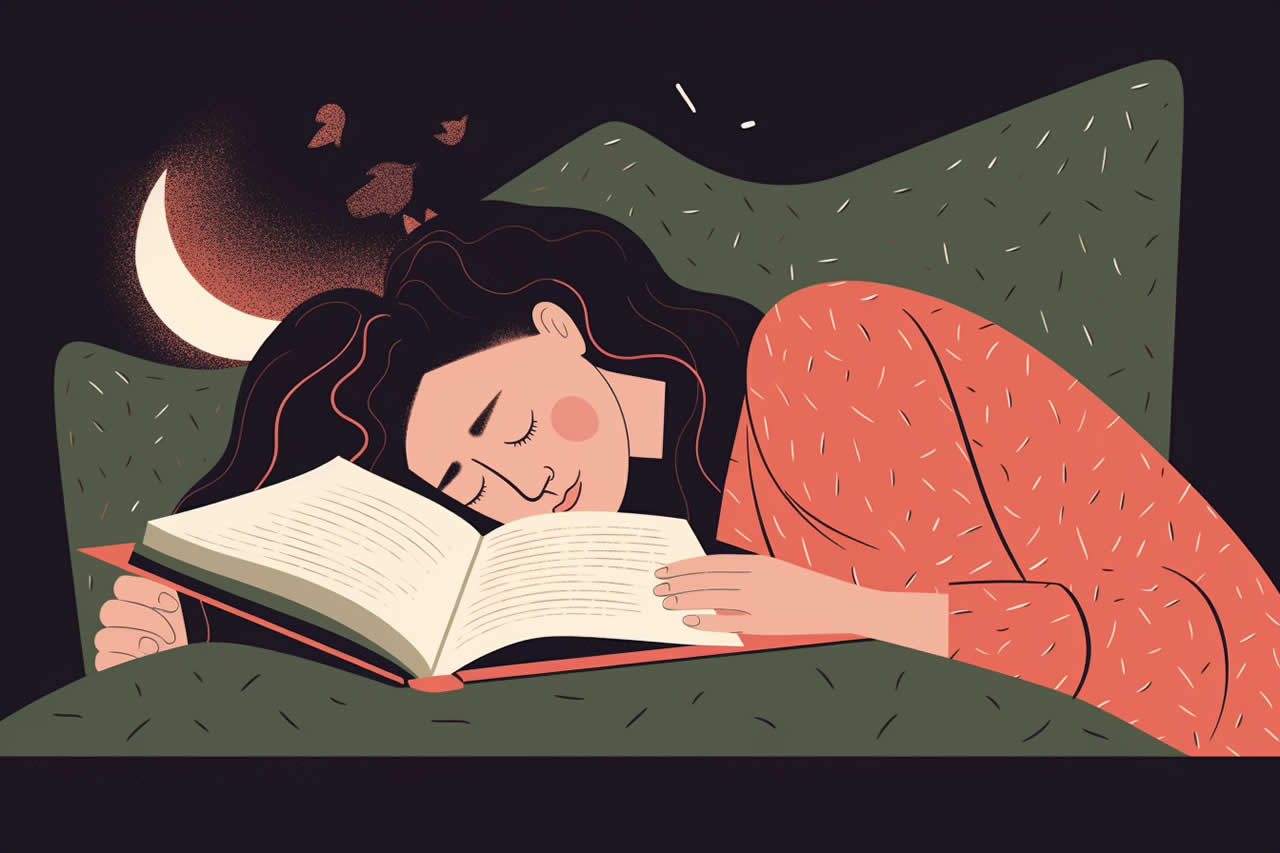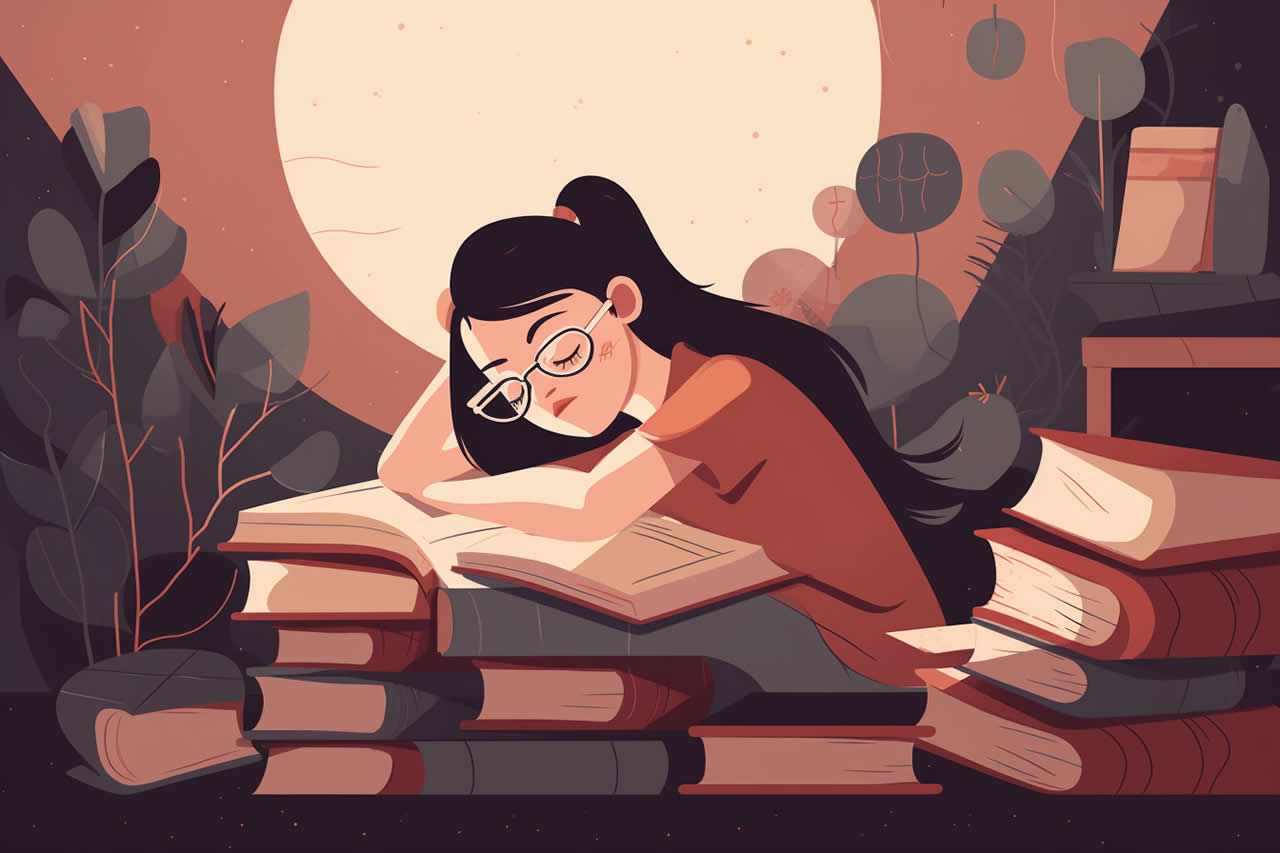Why Does Reading Make Me Tired?
Last Updated: 24 June 2023Written by Penny Somerset
Ever find yourself yawning and reaching for the pillow after only a few chapters of your favorite book? Trust me, I've been there too; it appears that reading can indeed tire us out. This post delves into why this happens - including factors like mental exertion, eye strain, reading's calming effect on our minds and bodies.

• Key Takeaways
• Why Reading Makes You Tired
• Mental Exertion And Concentration
• Eye Strain And Fatigue
• Relaxation And Calming Effect
• Lack Of Physical Activity
• Tips To Avoid Getting Tired While Reading
• Take Breaks And Stretch
• Read In Well-lit Environments
• Maintain Good Posture
• Engage In Active Reading
• The Final Chapter: Why Reading Sends You to Dreamland
Frequently Asked Questions
• 1. Why does reading make me tired?
• 2. How can I prevent feeling tired while reading?
• 3. Are there any techniques or strategies I can use to stay more alert while reading?
• 4. Should I be concerned if I always feel tired when reading?
• 5. Should I read before bed?
• Related Posts
Intrigued yet? Stick around; by discovering the reasons behind this phenomenon, you can better manage your energy while indulging in your literary passions.
Key Takeaways
-
Reading makes you tired because it requires mental exertion and concentration, leading to fatigue.
-
Eye strain is a significant factor contributing to the fatigue experienced after reading for long periods of time.
-
Reading has a calming effect on the mind, which can make you feel tired but also improve sleep quality.
-
Lack of physical activity during reading sessions can contribute to feelings of fatigue. Incorporate regular breaks and stretching exercises to combat this.
-
To avoid getting tired while reading, take breaks and stretch regularly, read in well - lit environments, maintain good posture, and engage in active reading techniques.
Reading makes you tired because it requires mental exertion and concentration, leading to fatigue.
Eye strain is a significant factor contributing to the fatigue experienced after reading for long periods of time.
Reading has a calming effect on the mind, which can make you feel tired but also improve sleep quality.
Lack of physical activity during reading sessions can contribute to feelings of fatigue. Incorporate regular breaks and stretching exercises to combat this.
To avoid getting tired while reading, take breaks and stretch regularly, read in well - lit environments, maintain good posture, and engage in active reading techniques.
Why Reading Makes You Tired
Reading makes you fall asleep because it requires mental exertion and concentration, leading to fatigue.
Mental Exertion And Concentration
Engaging in a profoundly cognitive activity like reading requires focused mental efforts and intense concentration. As your brain processes unfamiliar words, builds images from the text's descriptions, and keeps track of multiple characters or concepts, it uses physical energy just like any other part of your body would during physical work.
This high level of mental exertion can eventually lead to weariness over time.
The effect is notably amplified when you're delving into dense academic journals or deciphering complex narratives. Complicated storylines demand rapid switches between diverse threads requiring quick recollection of past events while interpreting the current context within the literature.
The demands placed on our memory recall during these moments can be mentally exhausting - a key factor triggering feelings of mental fatigue after reading sessions.
Eye Strain And Fatigue
As an avid reader, I've often asked myself, why does reading make me tired? My investigation into this common dilemma led me to uncover a culprit known as eye strain. Eye fatigue can sneak up on us while we're engrossed in our favorite books and it's a sneaky yet significant factor contributing to the fatigue we feel after hours lost in captivating stories.
Strain occurs when our eyes endure extended periods of use without breaks. For instance, following the twisting plot of a mystery novel without pausing or devoting hours poring over an intriguing biography can lead to this condition.
Eye strain isn't just about exhaustion though; it brings along pesky symptoms like headaches, blurred vision, twitching eyelids, watery or dry eyes - things that certainly paint a rather dire picture for your otherwise relaxing leisure activity! This shows that screen exposure isn't alone in causing tiredness - even traditional book reading leads to those weary feelings if not done mindfully.
So next time you wonder 'why does reading make me tired', know that your exhausted eyes might be signaling for some well-deserved rest!
Relaxation And Calming Effect
As a passionate reader, you might've noticed the soothing power of books. Engrossed in a good story, reality fades and our minds find peace amidst the words on pages. The sensation isn't by accident; reading inherently has a calming effect that can make us tired.
Seeing those shapes we recognize as letters and transforming them into meaningful dialogue or narrative requires mental energy. This effort engages your mind in an immensely focused task which might feel relaxing because it's distracting from other stressors around us - but don't be mistaken - it's like running a cognitive marathon! It explains why reading before bed can improve sleep quality.
Coupled with the tranquil ambiance of your cozy recliner or fluffy pillows in bed, this relaxation lures you easily to dreamland even post an intense plot twist in your ongoing novel. So next time when fatigue surrenders you while halfway through your favorite characters' saga, embrace its presence knowing it's just part of the journey.
Lack Of Physical Activity
Personally, I've noticed that one of the reasons why reading can make me feel sleepy and tired is because it often involves long periods of sitting or lying down without much physical movement. Lack of physical activity not only affects our energy levels but also impacts our overall mental and emotional well-being.
Research has shown that sedentary behavior can contribute to feelings of fatigue, leaving us feeling drained after a reading session. Incorporating regular breaks and stretching exercises while reading can help combat this lack of physical activity and keep us more alert and refreshed throughout our reading sessions.
Tips To Avoid Getting Tired While Reading
To avoid getting tired while reading, take breaks and stretch your body regularly. Sit in a well-lit environment to prevent eye strain and maintain good posture to reduce fatigue. Engage in active reading by asking questions or discussing the content with others.
Keep these tips in mind so you can enjoy reading for longer periods without feeling tired.

Take Breaks And Stretch
Taking breaks and stretching are essential to prevent tiredness while reading. Research shows that incorporating regular breaks into your reading routine can help improve focus and reduce fatigue. Here's why taking breaks and stretching is crucial:
-
Enhances blood circulation: Sitting for long periods can lead to reduced blood flow to the brain, resulting in lethargy and drowsiness. Taking short breaks allows you to get up, stretch your limbs, and boost blood circulation throughout your body, including your brain.
-
Relaxes eye muscles: Reading for extended periods can strain the muscles in your eyes, leading to eye fatigue and discomfort. Taking breaks provides an opportunity for your eyes to rest and relax, minimizing eye strain.
-
Restores energy levels: Reading requires mental focus and concentration, which can be draining over time. By taking intermittent breaks, you give your brain a chance to recharge and regain energy, preventing mental exhaustion.
-
Promotes physical activity: Sitting in one position for too long can also make you feel tired. Engaging in simple stretches or light exercises during breaks helps activate different muscle groups and keep you physically active.
-
Maintains attention span: Continuous reading without any breaks can decrease your attention span and comprehension levels. By taking short breaks every 30 to 60 minutes, you allow yourself time to refocus and stay attentive throughout your reading session.
Read In Well-lit Environments
Reading in a well-lit environment is crucial to prevent tiredness and keep your mind focused. Here are some reasons why:
-
Good lighting reduces eye strain: Reading in low light can cause your eyes to work harder to see the words on the page, leading to eye fatigue and making you feel tired. Adequate lighting ensures that your eyes can easily process the text, keeping you alert and engaged.
-
Increased visibility enhances concentration: When you read in a well-lit environment, you can see the words more clearly, allowing your mind to focus on the content without unnecessary distractions. This helps you stay engaged with the material and prevents mental exhaustion.
-
Bright lights stimulate wakefulness: Bright lights have been shown to suppress melatonin production, the hormone responsible for regulating sleep-wake cycles. By reading in a dimly-lit room, you're providing a signal to your brain that it's time to sleep, making it difficult to maintain wakefulness and energy while reading.
-
Natural daylight promotes alertness: If possible, try reading near a window or in an area where natural light is abundant. Exposure to natural daylight has been linked to improved mood and increased alertness, making it easier for you to stay awake and enjoy your reading session.
Maintain Good Posture
When reading, it's important to maintain good posture to prevent back pain and fatigue. Sitting or standing up straight while reading can alleviate strain on your muscles and reduce the risk of discomfort.
Poor posture, such as slouching or hunching over a book, can lead to muscle fatigue and even long-term issues like spinal misalignment. By sitting with your back straight, shoulders relaxed, and feet flat on the floor, you can create a more comfortable reading experience that allows you to stay focused for longer periods of time.
So next time you pick up a book, don't forget about the importance of maintaining good posture!
Engage In Active Reading
When reading, it's important to engage in active reading techniques to stay focused and prevent tiredness. Here are some tips to help you actively engage with the text:
-
Take notes: Jotting down key points or making annotations can help you stay engaged and better comprehend the material.
-
Ask questions: Challenge yourself by asking questions about the content as you read. This keeps your mind actively processing information and prevents boredom.
-
Visualize the content: Creating mental images of what you're reading can enhance your understanding and make the reading experience more interactive.
-
Make connections: Relate what you're reading to your own experiences or knowledge. This helps you actively engage with the material and makes it more relatable.
-
Discuss with others: Engaging in discussions about what you've read can deepen your understanding and provide different perspectives. Joining a book club or finding an online community can be a great way to do this.
The Final Chapter: Why Reading Sends You to Dreamland
Reading can make you feel tired due to the mental exertion and concentration required, as well as eye strain and fatigue from constant movement. However, it also has a relaxing effect on the mind, promoting a transition to sleep mode.
By taking breaks, maintaining good posture, and engaging in active reading techniques, you can minimize fatigue while enjoying your favorite books. So go ahead and grab that cozy spot for a good read!
Frequently Asked Questions
1. Why does reading make me tired?
Reading can make you tired for several reasons. One possible reason is that focusing on text for an extended period of time can strain your eyes, leading to eye fatigue and overall tiredness. Additionally, reading requires mental effort and concentration, which can also contribute to feeling tired.
2. How can I prevent feeling tired while reading?
To prevent feeling tired while reading, it's important to take breaks regularly. Look away from the book or screen every 20 minutes or so, and focus on something in the distance to relieve eye strain. Make sure you're well-rested before starting a long reading session and maintain good posture to avoid physical discomfort.
3. Are there any techniques or strategies I can use to stay more alert while reading?
Yes! One effective technique is active reading, where you engage with the text by asking yourself questions about what you're reading and making connections between new information and your existing knowledge. Taking notes or highlighting key points can also help keep your mind actively engaged in the material.
4. Should I be concerned if I always feel tired when reading?
If feeling consistently fatigued during or after reading becomes a chronic issue for you, it might be worth discussing with a healthcare professional as it could indicate an underlying health condition such as eye problems or sleep disorders like insomnia or sleep apnea. They will be able to provide further guidance and assistance in addressing this concern.
5. Should I read before bed?
Absolutely, reading before bed can be a fantastic way to unwind. Picture this: you're cozily tucked in, engrossed in a captivating novel, and suddenly, you're falling asleep reading. It's a common scenario, and there's a good reason for it. Reading helps transition your mind from the day's hustle to a more relaxed state, setting the stage for a full night's sleep. But remember, if you're consistently feeling sleepy and falling asleep while reading, it might be a sign that you're not getting enough sleep.
Now, don't get me wrong. Falling asleep reading isn't necessarily a bad thing, but if it's a constant occurrence, it's worth considering whether you have a sleep disorder. It's not a given, but it's something to keep in mind. So, should you read before bed? Absolutely! Just ensure you're also getting that full night's sleep. After all, you want to remember what you read, right? And if you're finding it hard to stop falling asleep while reading, it might be time to consult a sleep specialist. Happy reading and sweet dreams!
Related Posts
If you're struggling to stay awake when reading, take a look at our list of things you can do while reading.

Penny Somerset
I'm an avid reader and bibliophile. With an unquenchable thirst for stories, I love nothing more than burying my nose in a good book - whether it's curled up on the sofa or out in nature. My deep curiosity and appreciation of diverse writing means that there's no one genre that I prefer, but I'm especially keen on books full of adventure and vivid imagination.
Read more...
Receive unbeatable book deals in your favorite fiction or non-fiction genres. Our daily emails are packed with new and bestselling authors you will love!
Latest Articles
Why Do I Read So Slow?Should You Listen To Music While Reading A Book?
Are Books Dying?
Why Do Books Have Blank Pages?
Is Reading a Hobby?
Complete Guide to Richard Osman Books in Order
The Best Books About Learning Chess
How Often Should You Read?
The Cork O'Connor Books in Order
Deal-icious Reads: The Best Books Like 'The Deal'
Follow Us